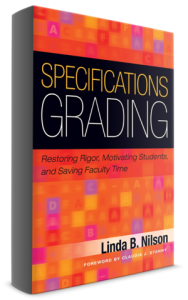 At Lancaster Learns 2025, I had the chance to catch a presentation by Nick Weaver, Assistant Professor of Mathematics here at Messiah University. It was a great introduction to adapting assessments to a mastery-based format that clearly reflects student learning. His presentation was based on the book Specifications Grading by Linda Nilson. Like others who promote “ungrading” the focus is more on the process of students gaining mastery of concepts and less about getting it right the first time.
At Lancaster Learns 2025, I had the chance to catch a presentation by Nick Weaver, Assistant Professor of Mathematics here at Messiah University. It was a great introduction to adapting assessments to a mastery-based format that clearly reflects student learning. His presentation was based on the book Specifications Grading by Linda Nilson. Like others who promote “ungrading” the focus is more on the process of students gaining mastery of concepts and less about getting it right the first time.
“Specs” are specific, measurable, and attainable assessment characteristics that students are expected to achieve to receive credit for an assessment.
Any course assessment can be molded to fit the specifications framework:
- Determine the ideal (or perfect) submission (and what makes it ideal)
- Convert ideal characteristics into attainable measures using the SMART acronym
- Provide a process for revise/resubmit to challenge students to achieve more
For me, this felt a little bit like a single point rubric, but in specs grading, students get your feedback without a grade (yet), providing the opportunity to use feedback to improve and resubmit. It’s more like complete/incomplete but students have to earn a complete to pass the course.
Lessons Learned
What I appreciated most in Dr. Weaver’s presentation is what he learned from using specifications grading for the first time. The biggest takeaway was that making and grading a new exam for 3 courses each week is no joke – he ended up spending from 1pm to 5pm consistently booked for outside-class exams.
Another lesson learned was the need to “help students stay motivated by setting a pace with smaller, sequenced deadlines” for reassessments and to prevent a deluge of end-of-semester grading. There should also be a limit to how many times they can resubmit.
Dr Weaver suggested a place to start is to pick one assessment type and try specifications grading, not an entire course!
If you are interested in learning more, check out the book or reach out to Dr. Weaver.